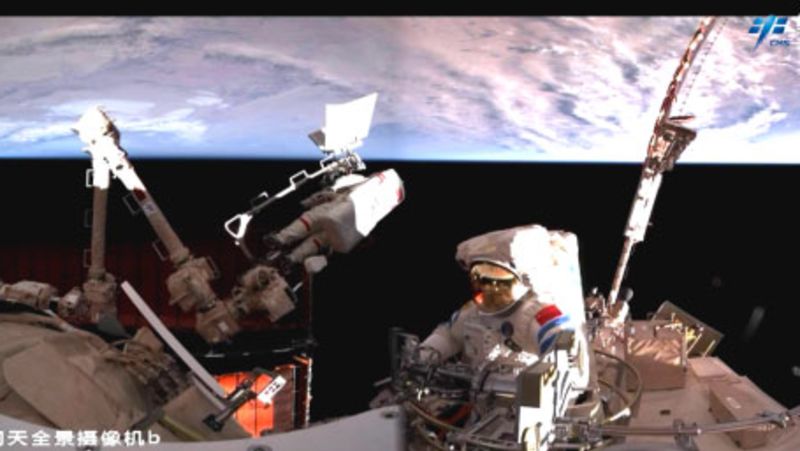World
The world won’t wait: Trump’s foreign policy takeover begins, from Syria to Ukraine

Trump, Zelenskyy welcomed by Macron for Notre Dame reopening ceremony
French President Emmanuel Macron and caretaker Prime Minister Michel Barnier welcomed guests to the reopening ceremony of Paris’ Notre Dame Cathedral.
WASHINGTON − The world isn’t waiting for Donald Trump’s inauguration.
Joe Biden is still president, but the focus of other world leaders − and the responsibility for the world’s problems − is fast shifting to the man who is set to move into the Oval Office in six weeks.
Witness Trump’s meeting in Paris over the weekend with French President Emmanuel Macron and Ukrainian President Volodymyr Zelenskyy to consider negotiations between Moscow and Kiev to end their 3-year-old war. And Trump’s declaration on social media Saturday of his determination to stay out of the stunning upheaval unfolding in Syria. “THIS IS NOT OUR FIGHT,” he wrote in all caps for emphasis.
And at Mar-a-Lago in Florida last week, Canadian Prime Minister Justin Trudeau’s unannounced arrival to discuss, among other things, Trump’s fresh threat to impose 25% tariffs on goods from Canada and Mexico.
An “excellent conversation,” the Canadian leader said afterward, though he won no assurances about the tariffs.
Gone is the long tradition that the United States has just one president at a time and that the president-elect generally tries to stay out of the way until taking the oath of office. That was a practice that preserved the sitting president’s authority and protected the incoming president from having to immediately deal with complicated crises.
It’s also the law. The Logan Act, signed by President John Adams in 1799, bars an unauthorized American from negotiating on behalf of the United States with a foreign government. The penalties can include prison time, although no one has ever been convicted of violating it.
But Trump’s takeover on the world stage began as soon as the election was over.
That reflects not only his personal inclination to speak out on all matters but also foreign leaders’ calculations about their imperative to move on. The differences in political philosophy between Biden and Trump − from viewing the U.S. as the world’s indispensable nation to declaring “America first” − threatens to create a sense of global whiplash as other capitals recalibrate for what’s ahead.
From imposing stiff tariffs to curtailing military aid to Ukraine, Trump promises some sweeping changes in Washington’s approach to the world.
On Sunday, for instance, Trump called for “an immediate cease-fire” in Ukraine. Meanwhile, the Biden administration is rushing to send weapons to Kiev before power in Washington changes hands.
Less shock, more calculation
The quick embrace by foreign leaders contrasts with eight years ago, when Trump unexpectedly won the presidency the first time.
In 2016, American pundits and the world’s leaders generally had assumed that Democrat Hillary Clinton − an establishment figure familiar as former first lady, New York senator and secretary of state − was going to win the White House over the brash Republican real estate development and reality TV star making his first bid for elective office.
Trump’s victory was met abroad with shock, alarm and some ridicule. At a NATO summit in 2019, Trudeau was caught on camera mocking the president in a conversation with then-British Prime Minister Boris Johnson, Macron and others. As Trump gave an impromptu 40-minute news conference, Trudeau said as the others laughed, “You just watched his team’s jaws drop to the floor.”
Trump called Trudeau “two-faced.”
This time, Trudeau’s preemptive pilgrimage to Trump’s home ground was an act of respect, almost fealty. When Trump traveled to Paris for the opening of the restored Notre Dame Cathedral, Macron seated him in pride of place, between him and his wife. Down the row of chairs was first lady Jill Biden.
Foreign governments, like American pols, took the possibility of a Trump victory seriously this time, with behind-the-scenes efforts to build relations with the candidate and his inner circle.
At the Notre Dame ceremony was Elon Musk, the world’s richest person and the president-elect’s new best friend. Last month, the Logan Act notwithstanding, Musk met with Iran’s ambassador to the United States on Trump’s behalf to discuss the fraught relationship between the two countries.
Wait − we’re still here
Biden isn’t ready to turn over power to the man he defeated four years and has been warning against ever since.
The Biden administration and France negotiated a cease-fire last month between Israel and Hezbollah militants in Lebanon, and they have restarted talks on a cease-fire between Israel and Hamas that could stop or pause the violence in Gaza.
What’s more, winning the release of the remaining Israeli hostages seized by Hamas on Oct. 7, 2023, is a goal of both Biden and Trump − a victory for Biden that would remove one pressing crisis from Trump’s plate.
After all, Trump’s top priorities from the campaign and since then have centered not on foreign policy but on domestic issues, including the mass deportation of undocumented immigrants, the development of more energy sources, and an overhaul of the federal government.
But his agenda as president may not be entirely up to him, given the pressing developments abroad.
“There will be ALL HELL TO PAY in the Middle East, and for those in charge who perpetrated these atrocities against Humanity” if all the hostages aren’t released by Jan. 20, he warned on social media. “Those responsible will be hit harder than anybody has been hit.”
Biden’s words have been more measured, telling hostage families, “I will not stop working to bring your loved ones backed home where they belong.”
That is, at least until Jan. 20.










